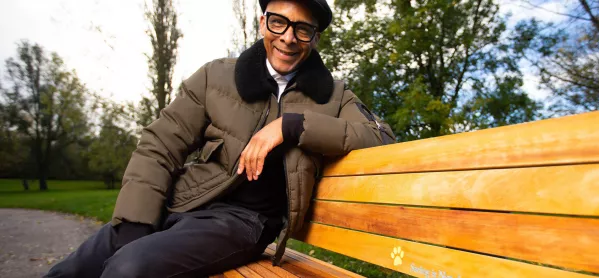WATCH: The Repair Shop’s Jay Blades praises teachers

TV presenter and furniture restorer Jay Blades has praised teachers for “doing a great job” and said society puts too much responsibility on the teaching profession.
Speaking at an event hosted by Holex and celebrating the Skills for Life strategy which turned 20 this year, Blades, who is famous for hosting the Repair Shop, spoke out about his dyslexia and said he would take his hat off to all teachers watching the stream.
When asked what advice he’d give teachers in helping dyslexic students he said: “I would say to teachers, you’re doing a great job, first and foremost, and also just be a little bit more understanding into how everybody is different and everybody learns in a different way and how can that person be best supported with the way that they learn.
“That’s the only thing but I think teachers do a great job. I’ve worked in a number of schools, in pastoral care and externally, and I must say that if I had my hat on ... I would take it off and salute all of the teachers watching this because you guys do a brilliant job, and sometimes society puts too much on you and too much responsibility.”
News: Stark attainment gap in 16-19 education, revealed
Long read: Meet Sue Pember, lead ‘activist’ for adult education
More: How to use Microsoft Teams to support dyslexic students
Jay Blades on living with dyslexia
Blades hit the headlines in early 2020 when he admitted he couldn’t read the scripts for The Repair Shop. In today’s event, he revealed he had been diagnosed with dyslexia while at university and spoke candidly about the coping measures he uses in everyday life.
He said: “Us dyslexic people we are super smart. We are just the ones that do things in a completely different way, so there will be a way of avoiding to fill in an application form, there will be a way of avoiding filling in or reading anything, it would just be like, ‘oh I’ve got a bit of dust in my eye, what does that say?’ Or you just totally divert the question somewhere else.
“There are coping strategies that you find in life, especially when you’re unable to read, when everything is text heavy, whether it’s an entry to a door or wherever the direction, it’s all in text, it’s almost as if everybody can read.
“So the people who can’t read just have to make it up as you go along. If you notice that there is a direction that everybody is going, go that way with them because obviously they’re following a sign that tells them to go through that door. I just found watching people a lot easier than reading, because you just follow the instructions of what they’re doing and you just follow suit really, so that’s how I did it.”
When it came to basic maths, English and digital skills - which were all at the heart of the Skills for Life strategy - Mr Blades said gaining those skills not only improves yourself, but those around you too.
He said “Every job, every TV thing that I do is all based on skills. It’s based on people coming together and knowing that you can learn from someone and then teach someone else about that. It is so beautiful when you’re able to learn a skill, and then go forward with that skill, because the skill allows you to develop not only yourself, but develop the people behind you, your family, your friends, and then you can influence other people. The other thing that’s even better than all of that is you can influence a community, and you’re influencing people that are not here yet.”
He added: “If you look at what I’m doing and everybody else behind me, we are all committed to skills and all about developing people whether it’s maths, English, whatever it is. We have to make sure that we bring this society back to the way it was and the only way we’re going to do that is by coming together and forming something which says, ‘we are going to do it’. Don’t tell me you’re not going to do it, make sure you do it.”
You need a Tes subscription to read this article
Subscribe now to read this article and get other subscriber-only content:
- Unlimited access to all Tes magazine content
- Exclusive subscriber-only stories
- Award-winning email newsletters
Already a subscriber? Log in
You need a subscription to read this article
Subscribe now to read this article and get other subscriber-only content, including:
- Unlimited access to all Tes magazine content
- Exclusive subscriber-only stories
- Award-winning email newsletters